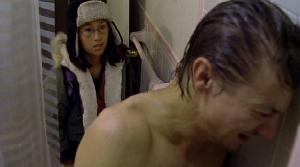
Twelve and Holding (Michael Cuesta, 2005)
The fourth of July of their twelfth year marked a different kind of emancipation for the three kids of Michael Cuesta's Twelve and Holding. After the accidental killing of Rudy Carges on the night of July 4, the unconventional pains of the beginnings of teen-hood start haunting the three close friends of the victim.
Rudy's twin brother Jacob (Conor Donovan, who also plays Rudy) has forever suffered being overshadowed by his perfect twin. A birthmark stains half of his face. The family tragedy has drastically affected his parents; his father has suddenly turned into a reclusive home buddy; his mom has transformed into a vengeful soul unhappy that the perpetrators of her son's death are merely given a year in juvenile hall. The sudden changes in demeanor and treatment, the rather quick decision in adopting a boy, urges Jacob to put matters in his self-inflicted perspective. Jacob turns from the child kept hidden by a hockey mask to an active participant (although discreet due to moral implications) in the affairs of his family, as his parents have turned into partial victims of the tragedy of July 4.
Grossly overweight, Leonard (Jesse Camacho) loses his sense of smell and taste after roughly escaping the July 4 tragedy. He loses his appetite, and with the added pushing of his coach, he decides to re-view his lifestyle. The only problem is that Leonard comes from a family of overweight, overeating people. The thought of Leonard eating an apple when buckets of oily food are served hurts his mother (Marcia deBonis) emotionally. Equipped with a new outlook on his health, Leonard tries to convince (by the only means his twelve year old mind can manage) his mother to eat right.
Be-spectacled Malee (Zoe Weizenbaum), daughter of the town's psychiatrist, is blossoming quickly. She falls in love with her mother's patient, construction worker Gus (Jeremy Renner). Convinced that the two of them are soul mates, Malee starts to stalk the troubled patient in his home --- catching him (in a moment of admirable intensity) crying in the shower. Armed with the knowledge of Gus' weak emotional points, Malee convinces herself that she is the panacea to her point of admiration's aches.
Twelve and Holding's three anti-parables work in a one-dimensional level. Cuesta and screenwriter Anthony Cipriano's film never quite reaches outside the meager effects of its overt metaphors. Their efforts are quite obvious (Fourth of July, American flags, even the characters who are staple points of criticism of American society). Their anecdotes are quirky in a way that is quite conventional in American independent cinema. The tragedies and dramatic high points are all tired; the commentaries on the troubling secrets of American suburbia are oft-repeated and are more convincingly manipulated by other filmmakers. Absent the typical and obvious metaphors, Cuesta and Cipriano are left with three coming-of-age films that are more provocative than compelling. A shallow emotional thrust muddles the film's pretentious depth; each of the tales' endings merely bursts in unfavorable disappointment. With Cuesta's previous work (L. I. E. (2001)), you can only expect groundbreaking, even if provocative and limit-breaking in its ways and designs. However, Twelve and Holding is nothing extraordinary if shown side by side with the rest of Sundance's angsty angry fare.
0 comments:
Post a Comment